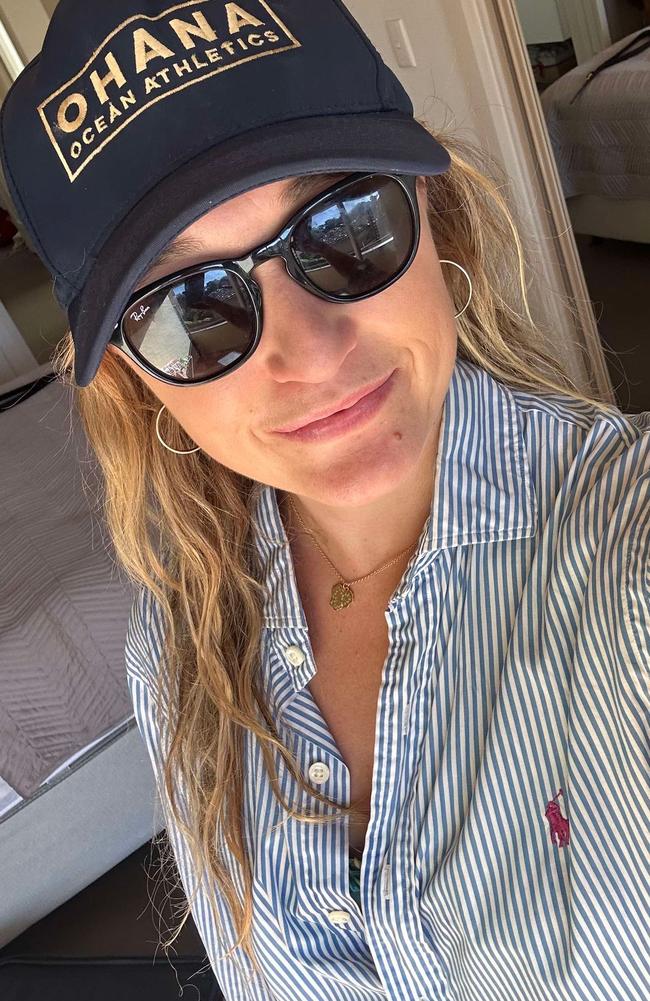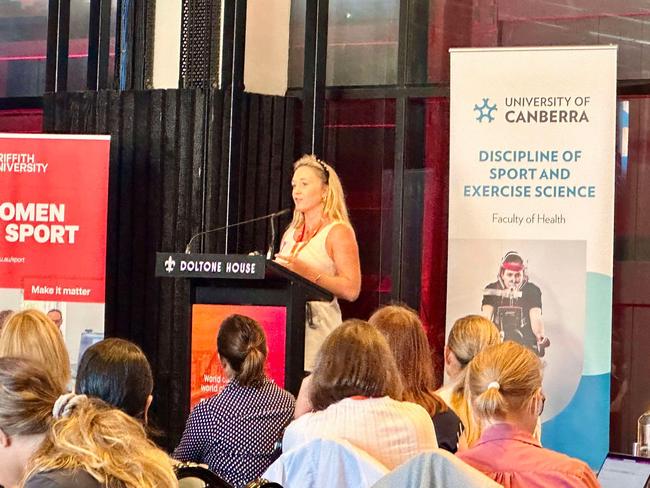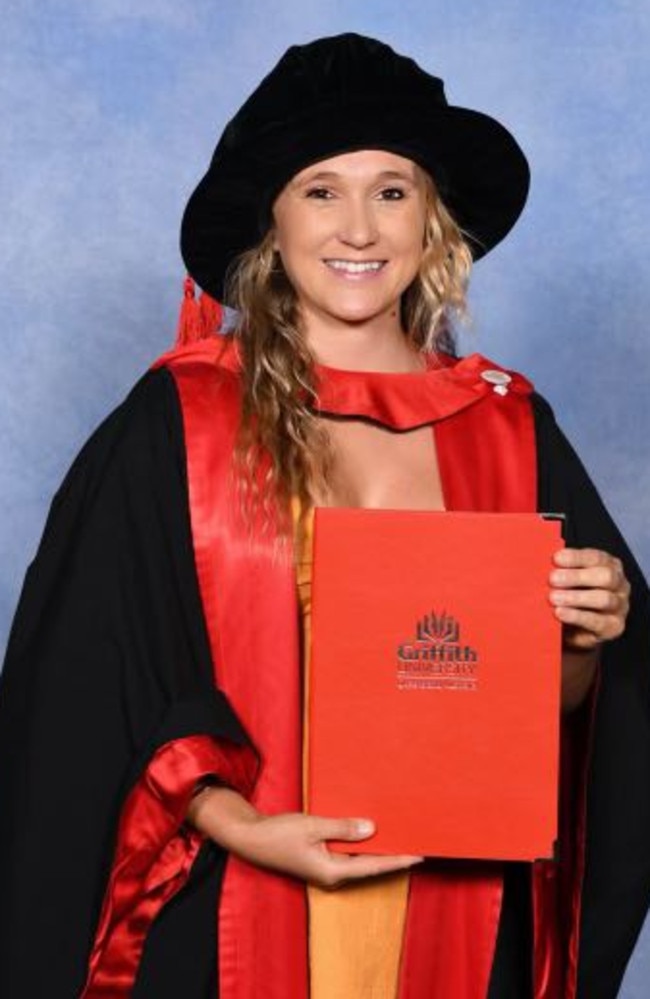Athlete reveals hidden pain that plagued her for a decade
A 32-year-old woman has shared how a simple, “innocent” act when she was younger led to more than a decade of pain.
Health
Don't miss out on the headlines from Health. Followed categories will be added to My News.
A 32-year-old woman has shared how a lifelong battle with not feeling “good enough” has shaped her career, and now she is helping others avoid the same pain she experienced.
Dr Jennifer Hamer was just 12 years old when she was diagnosed with anorexia that actively gripped her life for more than a decade.
The Englishwoman had gone to primary school in a small village where she was the best in class and had many external achievements. But, when she started at a competitive, all-girls high school that changed and so did how she felt about herself.
“I learned from that very young age to kind of validate my whole being through all of these external achievements and rewards and praise that I received,” Dr Hamer told news.com.au.

“And so when I moved to secondary school, I was suddenly in this really big, all girls competitive school, and I wasn’t in the spotlight anymore. I wasn’t the best at everything.”
She said that was the start of her eating disorder, saying it was an innocent want to be a bit healthier that left her “laying on a bed fighting for my life in the end”.
She quickly changed her eating habits and her parents caught on, taking her to a doctor. Initially, she was diagnosed with glandular fever despite no tests being done for it. A second doctor diagnosed her with an eating disorder and she started outpatient treatment.
However, not long after her diagnosis the then-active teenager was talent spotted as a runner who had potential — specifically in the endurance running space.
She started training three times a week with her local running group and ended up training six times a week all up.
“While there was a real love and passion for the sport, it was always overshadowed by this fact that I had an eating disorder,” she said.
“So there would be one part of me that just loved this feeling of running, but then there was also this other part that was like, this is also a real good way for you to control your weight and your behaviours around your eating disorder.”

Dr Hamer said she maintained a “functional” eating disorder for all her athletic career, saying she was never “sick enough” to be classed as unwell. She went to university to pursue her athletics career but unfortunately experienced bullying which pushed her back into a dark place.
In 2015, at the age of 22, she was admitted into an inpatient unit as she was incredibly unwell. For the first few weeks, she wasn’t complying with treatment and still very much in the grips of her eating disorder.
However, there was a pivotal moment, and she has no idea what sparked it, where she woke up and realise she didn’t want to live that way anymore. For the first time in a long time, there was a glimmer of herself rather than her eating disorder.

She dug deep and began to comply with treatment, saying her athlete mindset was “invaluable” as the recovery was very much goal orientated.
However, nearly a decade on from her inpatient treatment there are still some lingering impacts, and while she has worked hard to reverse things such as osteoporosis and stress fractures.
Even her immune system will never be the same again.
But, it’s the mental impacts that linger the most, with the 32-year-old saying she doesn’t think there is ever a finish line when it comes to recovery.
“I’m almost 10 years into recovery, and you still have to say yes to it every day, and especially during challenging times of your life, or when unexpected hiccups arrive and there’s a lot of stress or pressure, and that ability to have coping mechanisms and not self sabotage yourself again.”

She said there is also the important acknowledgment that she is vulnerable to mental health conditions, saying she is now starting to go back and do a lot of healing work with her inner child who never felt good enough.
Since Dr Hamer’s inpatient admittance, she was finally able to go back to university and study sports science while still living at home as she needed that family support before taking on a master’s degree in eating disorders and clinical nutrition.
The study made her realise she wasn’t as far along in her recovery as she thought, and once again became obsessed with healthy eating and exercise to a point of it becoming orthorexia. But, it helped her wake up and realise she needed help and she got support once again.
Then she was offered a scholarship to complete her PhD looking into eating disorder prevention when it comes to athletes in Australia. She completed that last year, working with Swimming Australia and now the Australian Institute of Sport.
“I got the opportunity to build educational workshops for coaches around language and behaviour practices that they’re using that could be predisposing swimmers to risks, but also to help equip them with the skills to identify swimmers that might be at risk, or how to create healthier training environments,” she said.

“And so really bringing awareness around the situation within the sport. And now I’ve been really lucky to get a project lead role with Australian Institute of Sport, where we’re looking to build off that work that I did with Swimming and see if we can start scaling it across other sports.”
She said there is almost a normalised stance around disordered eating in sport, with comments such as “they don’t eat that because they’re an athlete”. However, she said it was incredibly refreshing during the Paris Olympics to see athletes use their voices to call this behaviour out.
September 2 until September 8 is Body Image and Eating Disorders Awareness Week, with the Butterfly Foundation launching its Kindly Do, Kindly Don’t campaign to consider the impact of your words.
More than 1.1 million Australians live with an eating disorder and less than one in three seek support, with the Body Kind Youth Survey showing 77 per cent of those aged 12-18 are teased about their appearance at school, and more than half are dissatisfied with their bodies – a serious risk factor in the development of an eating disorder.
Melissa Wilton, Butterfly’s Head of Communications and Engagement, said: “We hear from people with lived experience every day that words and actions around food, appearance and bodies can have a serious impact on their recovery, and may contribute to the development of an eating disorder in the first place.

“While we know that people are often well intentioned, this campaign is a kind reminder to all of us to be more mindful of why language matters. With an increasing prevalence of eating disorders in Australia, it’s never been more critical to encourage body kindness and help-seeking.”
Dr Hamer said it’s so important for herself to share her story because she said she’s struggled with the “glamorisation” of her recovery.
“I think something that people can struggle with when they share their story and they become such an advocate in this space, is it can become a little bit of an identity,” she said.
“Now what I’m trying to do is channel it as ‘this was a chapter in my life’, and for everyone who might be experiencing something similar, this is also potentially a chapter in your life, but that’s literally what it is.
“It’s a chapter. It’s messy, it’s dark, it’s horrible, it’s painful, but that chapter is equipping you with so many skills, so many traits and capabilities, to then move into your next chapter — wherever that takes you — and then apply them in a way that’s positive for you.”
She said so many people will experience dark chapters but it’s about how you move forward from it, while recognising that it is part of your story, and getting to choose your next path.
Originally published as Athlete reveals hidden pain that plagued her for a decade





